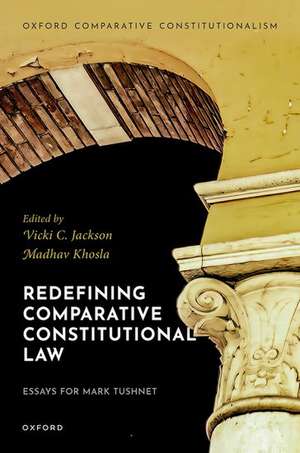Redefining Comparative Constitutional Law: Essays for Mark Tushnet: Oxford Comparative Constitutionalism
Madhav Khosla, Vicki C. Jacksonen Limba Engleză Hardback – 6 ian 2025
Preț: 750.45 lei
Preț vechi: 1073.99 lei
-30% Nou
Puncte Express: 1126
Preț estimativ în valută:
143.60€ • 153.56$ • 119.73£
143.60€ • 153.56$ • 119.73£
Carte disponibilă
Livrare economică 17-22 martie
Preluare comenzi: 021 569.72.76
Specificații
ISBN-13: 9780198891451
ISBN-10: 0198891458
Pagini: 464
Dimensiuni: 165 x 241 x 32 mm
Greutate: 0.85 kg
Editura: OUP OXFORD
Colecția OUP Oxford
Seria Oxford Comparative Constitutionalism
Locul publicării:Oxford, United Kingdom
ISBN-10: 0198891458
Pagini: 464
Dimensiuni: 165 x 241 x 32 mm
Greutate: 0.85 kg
Editura: OUP OXFORD
Colecția OUP Oxford
Seria Oxford Comparative Constitutionalism
Locul publicării:Oxford, United Kingdom
Notă biografică
Madhav Khosla is an Associate Professor of Law at Columbia University. He is interested in the nature and form of constitutions, especially from a comparative and theoretical perspective. Khosla studied political theory at Harvard University, and law at Yale Law School and the National Law School of India University, Bangalore. Before joining Columbia Law School, he was a Junior Fellow at the Harvard Society of Fellows. Khosla's books include India's Founding Moment, which was an Economist Best Book of 2020 and co-winner of the Order of the Coif Book Award 2021.Vicki C. Jackson, Laurence H. Tribe Professor of Constitutional Law at Harvard, works on comparative constitutional law, U.S. constitutional law, and federal courts. Previously she was Carmack Waterhouse Professor of Constitutional Law at Georgetown University. She is the author of Constitutional Engagement in a Transnational Era (2010), coauthor, with Mark Tushnet, of Comparative Constitutional Law (3d ed. 2014), and co-editor, with Yasmin Dawood, of Constitutionalism and a Right to Effective Government? (2022), among other works. Her scholarship concerns knowledge institutions, effective government and constitutionalism; judicial independence and the Supreme Court, free expression, federalism, pro-constitutional representation, proportionality review, equality, unconstitutional amendments, and standing.














